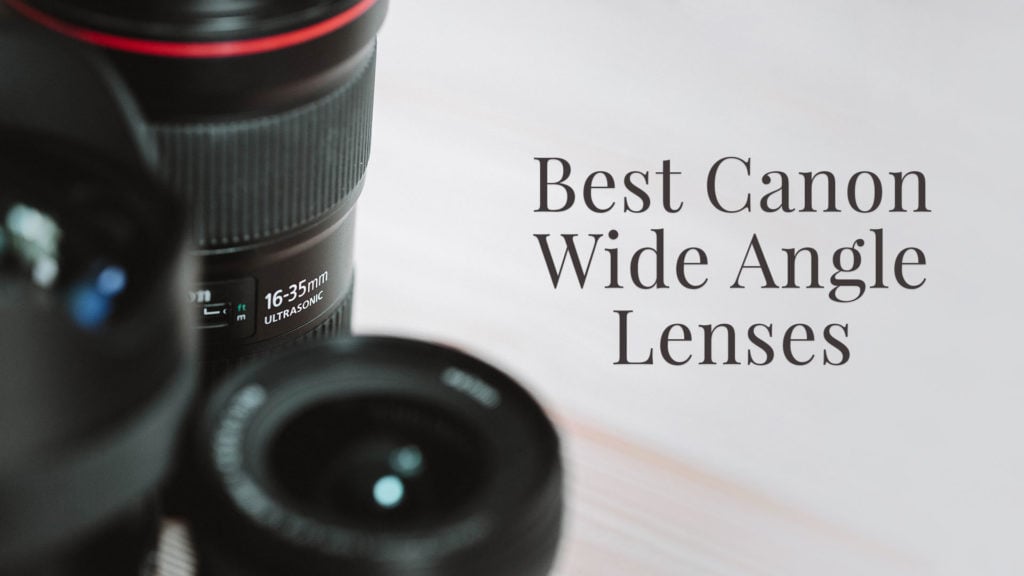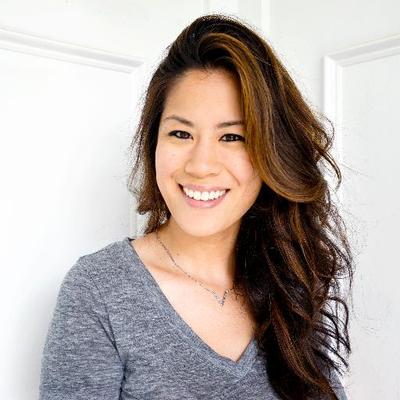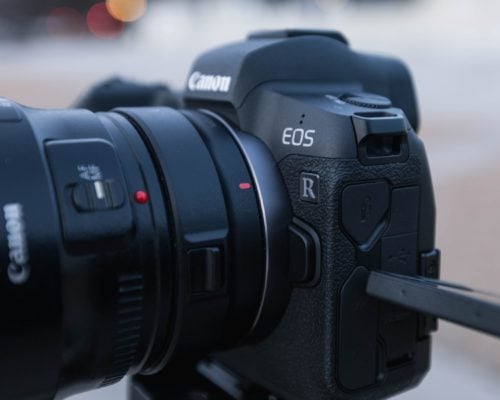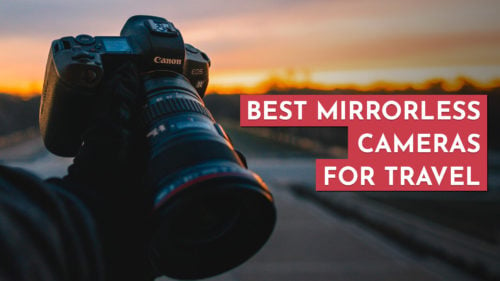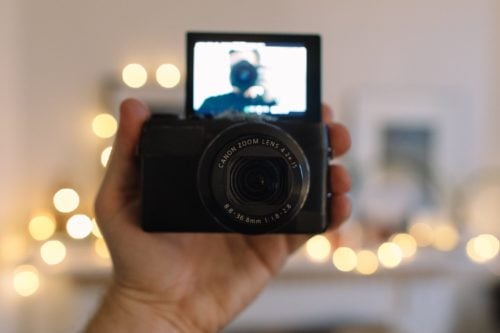Here is a breakdown of all of the best wide angle lenses for Canon cameras including a range of price options and sensor types.
Every photographer should have a range of lenses in their bag and a wide angle lens is no exception; especially for landscape photographers. Canon offers over 20 wide angle lenses to choose from, in this post I’ll go over which ones are worth using.
If you’ve been shooting on a kit lens, zoom lens, or a 50mm prime it’s time to take your travel photography to the next level with a wide angle lens for your Canon camera.
Over the years I have used many wide angle lenses on my Canon Cameras including full-frame and cropped sensors including Canon mirrorless and DSLR cameras. So here are my picks for the best wide angle lenses for Canon cameras.
Best Canon Wide Angle Lenses
- What is a Wide Angle Lens?
- 1. Canon RF 15-35mm f/2.8 IS – Best for Canon RF Mount Wide Angle
- 2. Canon RF 14-35mm f/4 IS – Affordable RF Mount
- 3. Canon RF 15-30mm f/4.5-6.3
- 4. Canon RF-S 10-18mm f/4.5-6.3 – Best for RF-S Mount
- 5. Canon RF 10-20mm f/4 – Widest Canon Lens
- 6. Canon RF 16mm f/2.8 – Best Compact RF
- 7. Canon RF 24mm f/1.8
- 8. Canon EF 17-40mm f/4L – Budget + Quality
- 9. Canon EF 16-35mm f/2.8L III – Best EF Mount Wide Angle Lens
- 10. Canon EF-S 10-18mm f/4.5-5.6 – Best for Cropped APS C Sensors
- 11. Canon EF 24mm f/1.4 II
- 12. Sigma EF 14mm f/1.8 – Ultra-wide Prime
- 13. Canon EF 11-24mm F/4
- Frequently Asked Questions About Canon Wide Angle Lenses
First let’s talk about what a wide angle lens is if you aren’t familiar.
What is a Wide Angle Lens?
Wide angle lenses are important for any photographer that loves to shoot landscapes, cityscapes, or even interiors. A wide angle lens is typically 35mm or less which means you’re getting more in the frame. You can also use a wide angle lens for creative portraits but it’s recommended to use a 50mm lens for portraits.
If you have a cropped sensor camera (referred to as an APS-C sensor) like on a Canon Rebel or Canon R7, your lenses will have a different field of view. Canon cropped sensors (APS-C) are 1.6x cropped. So a 10mm lens on a cropped sensor will be equivalent to a 16mm. Canon lenses that are designated for cropped cameras are called “RF-S” or “EF-S” lenses. Learn more about the differences between full frame and crop sensor cameras.
This list is full of lenses that are primarily for full frame cameras but I have included a few options designed for Canon APS-C sensors. It’s also important to note that all Canon RF lenses work on cropped Canon mirrorless cameras like the R7.
One benefit of wide angle lenses is when using longer shutter speeds while using your camera handheld. This is because any amount of shake is significantly reduced because there is less movement in the frame if you shake.
One other thing to look at is build quality of lenses. Typically L-series lenses from Canon will have weather sealing meaning it’s designed to be used in rainy or dusty conditions.
Update November 2023: Added the new Canon RF-S 10-18mm.
Update October 2023: Added the new Canon RF 10-20mm.
Update April 2023: Updated references to talk about cropped Canon RF cameras.
Update July 2022: Added Canon’s newest wide angle lenses the 24mm and 15-30mm.
Update January 2022: Since Canon has announced they are no longer making DSLR cameras I have listed RF mount (mirrorless) lenses at the top of the list. If you need a wide angle lens for an EF mount Canon camera you can find them at the bottom of the list.
Personally I have shot with many Canon lenses so here are my recommendations of the best wide angle lenses for Canon Cameras:
1. Canon RF 15-35mm f/2.8 IS – Best for Canon RF Mount Wide Angle
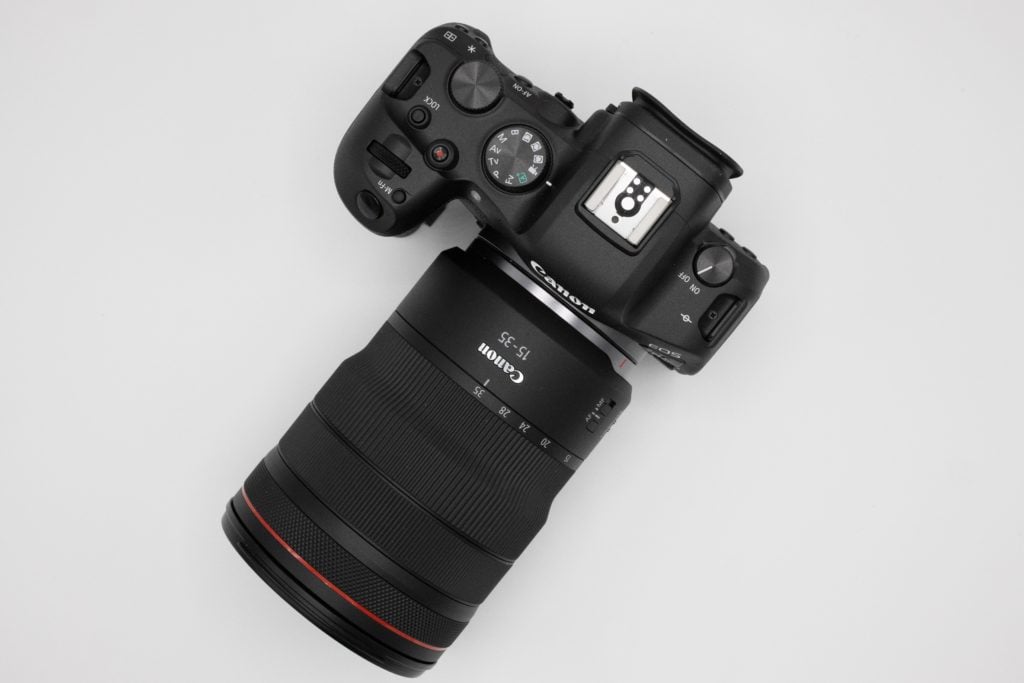
- What I Like: The RF 15-35mm f/2.8 offers excellent image quality, lens stabilization for steady shots, and fast autofocus.
- What I Dislike: The lens has some drawbacks, like being expensive and displaying soft edges at lower apertures.
The Canon RF 15-35mm f/2.8 IS is one of Canon’s newest lenses for their full-frame mirrorless mount; the RF mount. The Canon RF 15-35mm is typically the lens on my camera for landscape and travel photography. In my opinion this is one of the best Canon lenses available and I always make sure it’s in my camera bag.
Thinking about buying the Canon RF 15-35mm?
Read: RF 15-35mm Sample Images
The RF 15-35mm f/2.8 packs extremely good image quality and even image stabilization. Its maximum aperture of 2.8 is great for low-light shots. Since it’s 1mm wider than the standard 16-35mm lens you’ll be able to cover a large angle of view. The lens also has 5-stops of lens stabilization and 8-stops of stabilization when combined with an RF camera with IBIS. This is the best wide angle lens for the Canon EOS R5, R8, R3 and other RF full-frame cameras. One downside is the large price tag and weight of this RF lens. This is my pick as the best wide angle lens for Canon full frame mirrorless cameras.
- High image quality and bright f/2.8 wide-angle zoom RF L lens
2. Canon RF 14-35mm f/4 IS – Affordable RF Mount
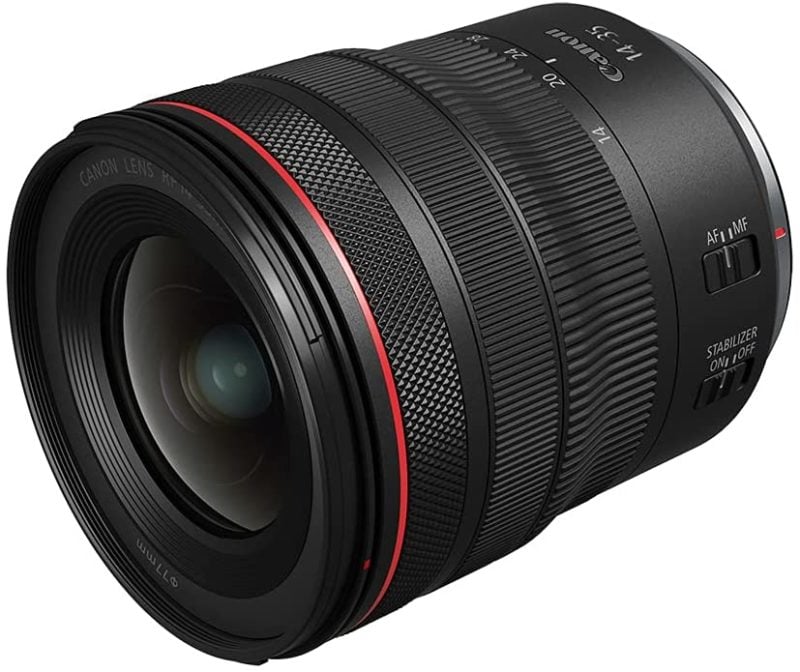
- What I Like: The lens boasts a compact design, a large focal range for versatile shooting options, and lens stabilization for steady shots.
- What I Dislike: The lens has a minor drawback: the wider focal range requires lens correction, which can be easily addressed in post-processing.
This Canon RF lens is an incredibly sharp f/4 wide angle. The Canon RF 14-35mm f/4 features a compact design perfect for real estate photography, travel, and even vlogging. Plus it has image stabilization to give you a few extra stops of light when shooting.
Additionally if you’re into using circular filters the Canon RF 14-35mm is one of the few 14mm lenses that has threading for circular filters. Filters may appear in the edge of the frame at 14mm but is easily corrected with the lens correction profile.
- Dramatic, creative possibilities with 14mm ultra wide-angle coverage.
3. Canon RF 15-30mm f/4.5-6.3
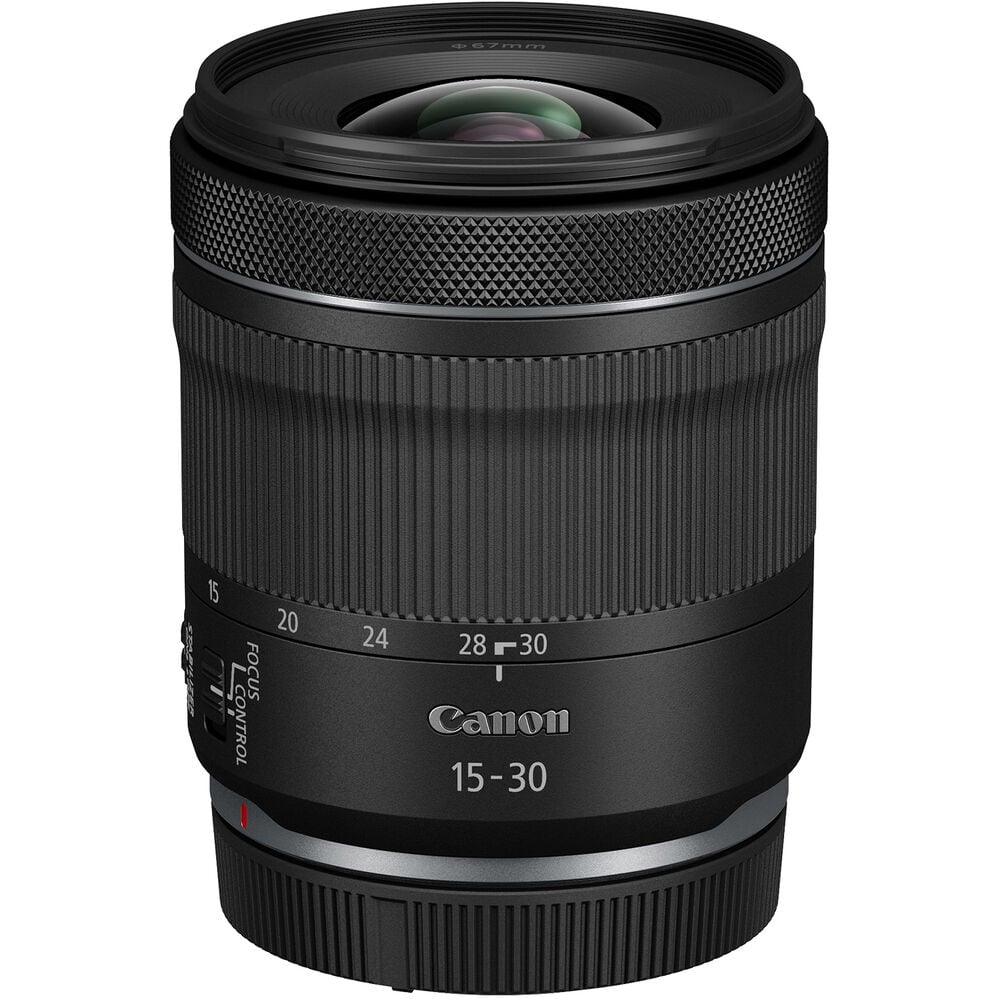
The Canon RF 15-30mm f/4.5-6.3 IS STM lens is a compact, wide-angle lens for full-frame RF-mount cameras, perfect for landscapes, architecture, and street photography. With an aperture range of f/4.5 to f/32, UD and aspherical elements, and Super Spectra Coating, it delivers sharp images with reduced ghosting and flare.
The lens features an Optical Image Stabilizer, STM stepping AF motor, and a customizable control ring for smooth operation. Its 1:2 magnification and 5.1″ minimum focus distance enable captivating close-ups, while the 7-blade diaphragm ensures pleasing bokeh.
- RF ultra wide-angle zoom lens for the EOS R series cameras.
4. Canon RF-S 10-18mm f/4.5-6.3 – Best for RF-S Mount
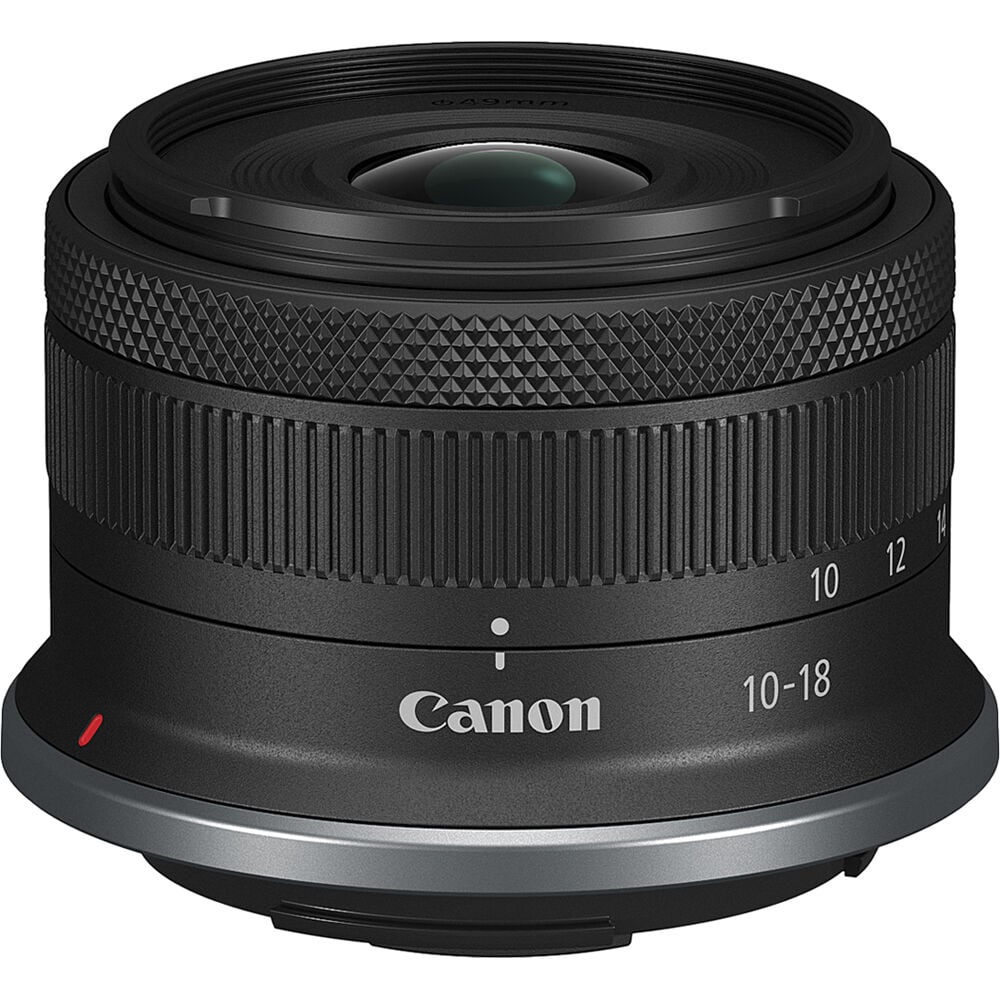
- What I Like: Superb for vlogging due to its ultra-lightweight design, and ideal for wide-angle shots with APS-C RF-mount cameras. The lens maintains sharpness and clarity, a must for high-quality video content.
- What I Dislike: The variable aperture of f/4.5-6.3 might limit its use in lower light settings, but this is a common trade-off in zoom lenses that favor compactness and price.
The RF-S 10-18mm lens emerges as a prime choice for vloggers and photographers using APS-C format RF-S mount cameras like the Canon R100. It covers a versatile full-frame equivalent range of 16-29mm, allowing for expansive landscape and dynamic urban captures.
Its lightweight build and effective image stabilization, offering up to four stops of correction, make it invaluable for handheld video shooting — a crucial feature for on-the-go vloggers. The lens construction includes an aspherical element and two UD elements, ensuring high-resolution results across the entire zoom range. Coupled with the STM stepping motor that guarantees smooth, silent autofocus, it’s a dream lens for video creators and still photographers alike. Whether you’re capturing travel vlogs or exploring street photography, this lens balances practicality with performance.
5. Canon RF 10-20mm f/4 – Widest Canon Lens
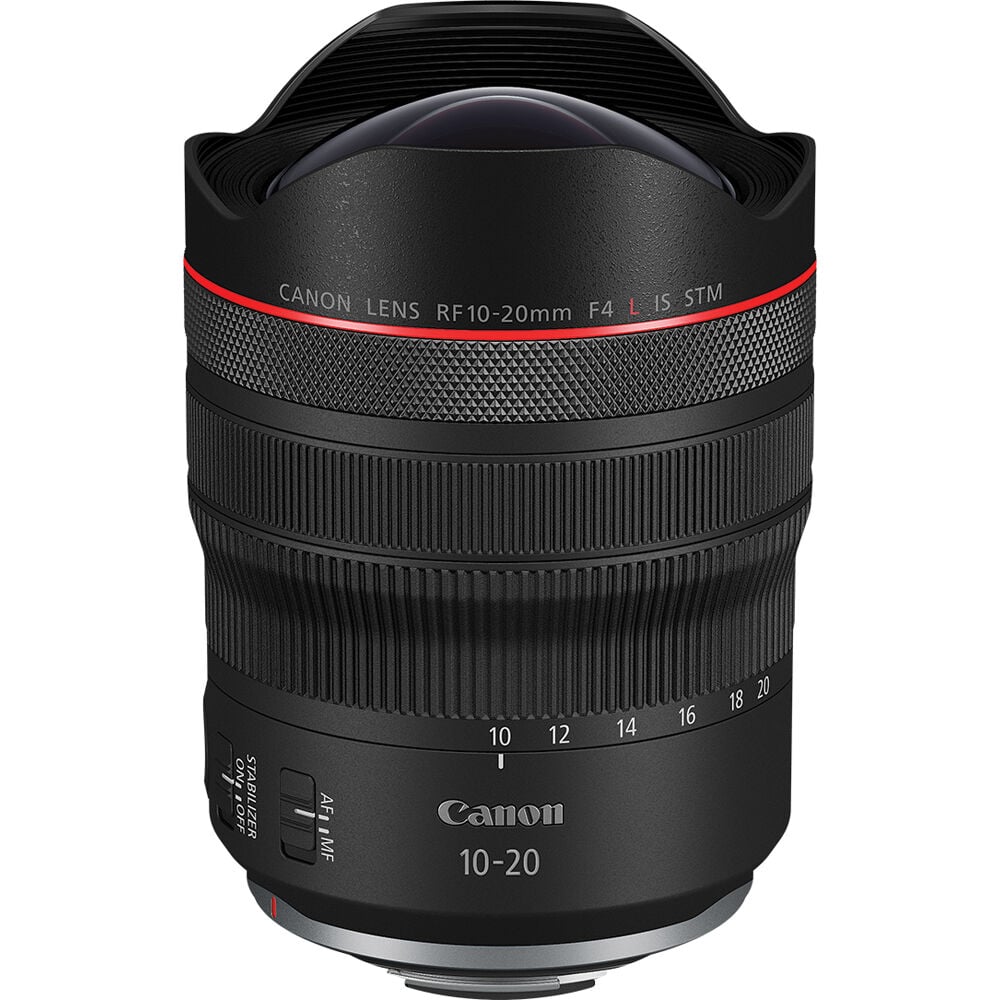
- What I Like: Amazing focal range with no distortion like many wide angle lenses plus optical image stabilization!
- What I Dislike: Large price tag and f/4 aperture.
Canon has finally made a successor to the Canon 11-24mm with the Canon RF 10-20mm f/4 L IS STM. The RF 10-20mm features an f/4 to f/22 aperture, optical image stabilization, and an ultra-wide perspective without distortion.
6. Canon RF 16mm f/2.8 – Best Compact RF
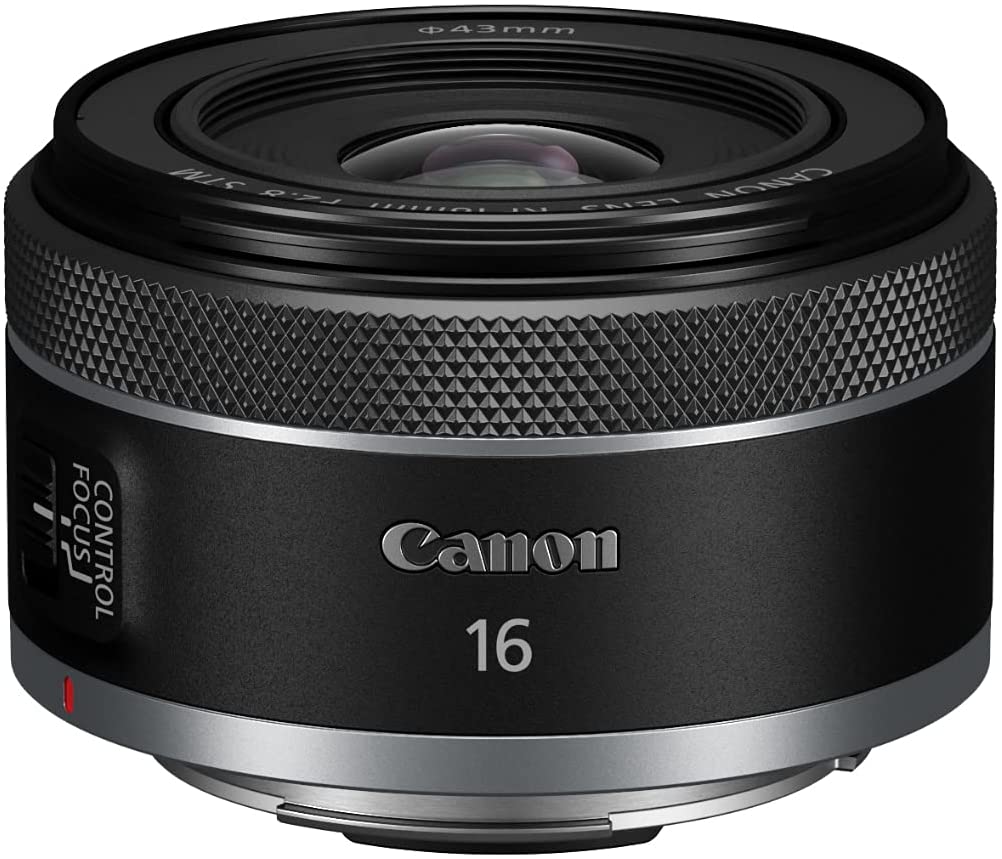
- What I Like: This extremely tiny lens offers an incredible field of view (FOV) and comes at an affordable price.
- What I Dislike: However, the image quality is somewhat lacking, and there’s no ability to zoom in or out.
This tiny 16mm for Canon’s RF mount will make a great addition to any photographer’s bag. Whether you want to use it for vlogging or architecture the size and price of the Canon 16mm f/2.8 is unmatched. Since it’s a prime lens you won’t be able to zoom in or out.
- Canon’s first ultra wide-angle, fixed focal length RF lens
7. Canon RF 24mm f/1.8
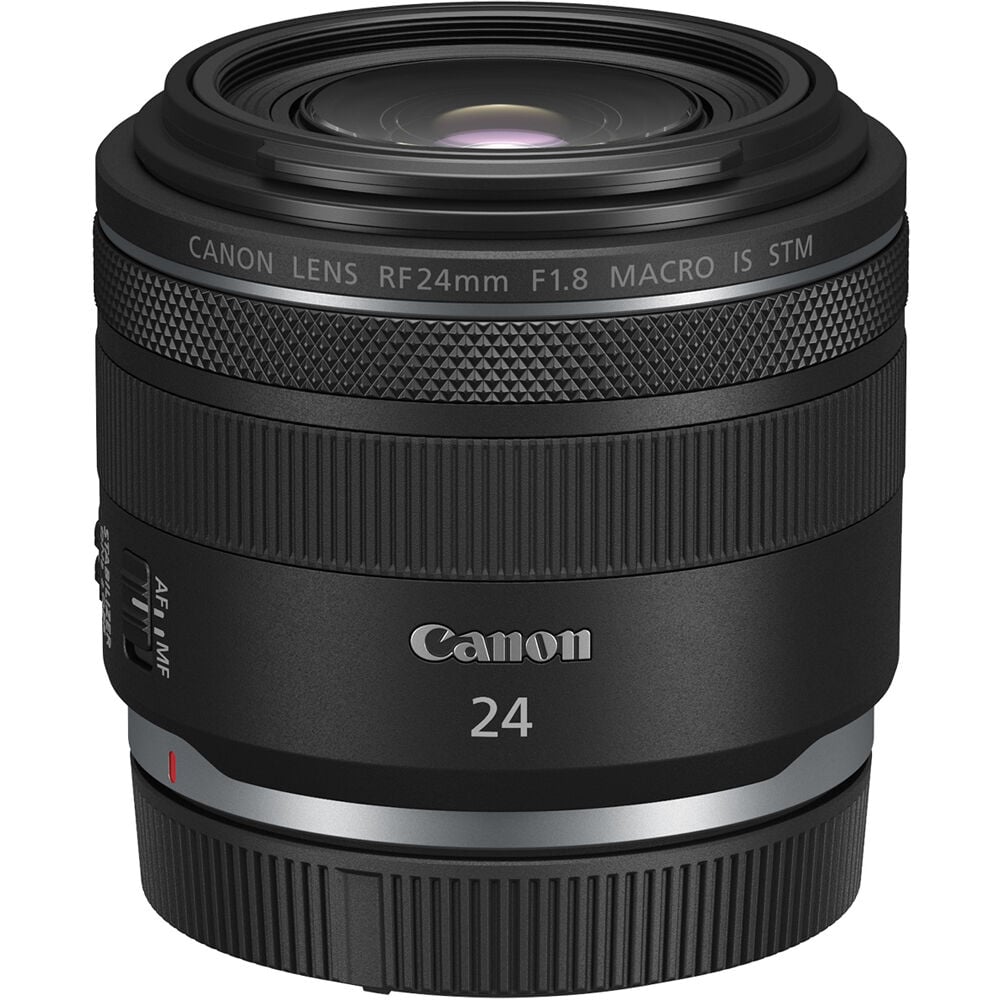
- What I Like: One of my favorite focal lengths plus a great price!
- What I Dislike: Weak optics when compared to L series lenses.
Canon has released their latest lens for the RF system the Canon RF 24mm f/1.8 Macro. Featuring lens stabilization, a low min focusing distance, and small design the RF 24mm will make a great addition to any photographer’s bag. The RF 24mm f/1.8 has a minimum focusing distance of 5.5 inches making it a great macro lens as well.
8. Canon EF 17-40mm f/4L – Budget + Quality
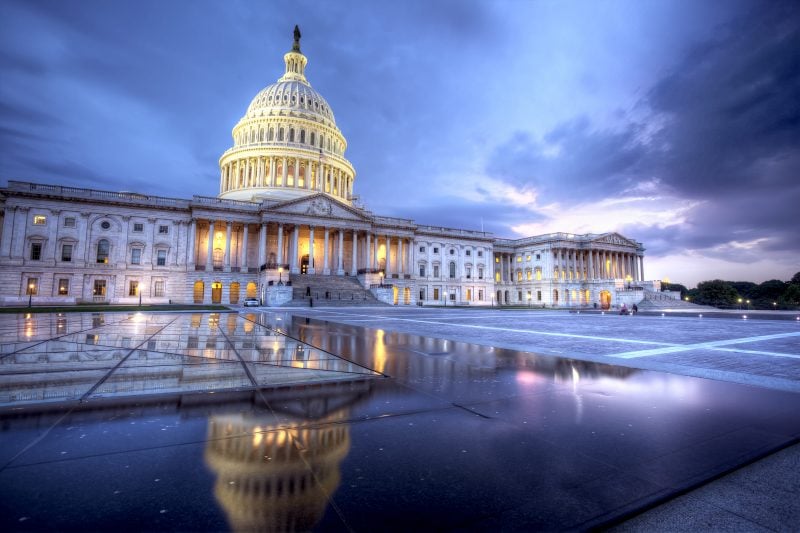
- What I Like: This L series lens offers a great price, along with an impressive focal range for various shooting situations.
- What I Dislike: The f/4 aperture can be limiting for handheld shooting in low light conditions, and the lens has an EF mount, which is becoming outdated.
If you’re looking to get into landscape or architecture photograph this 17-40mm L lens is a great bang for your buck to get into wide-angle photography.
If you shoot with a tripod the Canon 17-40mm f/4 is a fantastic wide angle choice. You can pick one up around for around $599 which is on the lower end for an L series lens (L series is Canon’s premium line of lenses). This lens is especially good if you’re just getting into real estate or landscape photography.
I shoot with the Canon EF 17-40mm 80% of the time. I love it for beautiful sunrises and capturing the entire landscape. It’s super sharp and the results are great.
Photographer
One downside of the Canon 17-40mm is the fact that it has an f/4 aperture. So if you’re up late shooting at night or in low light you’ll want to bring a tripod to get full advantage of this lens.
- 17-40 millimeter ultra wide angle zoom lens with f/4 maximum aperture for Canon SLR Cameras. Diagonal angle of view 104° 57° 30'
9. Canon EF 16-35mm f/2.8L III – Best EF Mount Wide Angle Lens
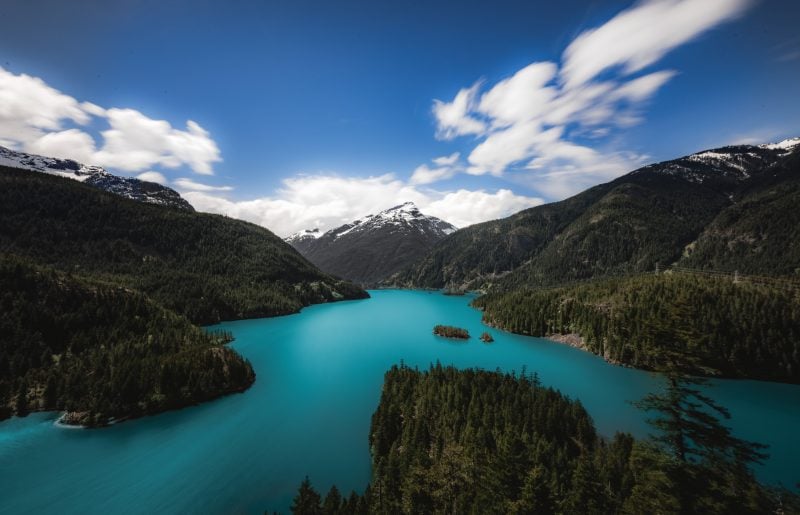
- What I Like: This sharp lens features a great focal range and a fast f/2.8 aperture, perfect for low-light conditions and achieving beautiful bokeh.
- What I Dislike: However, it is an expensive option and has an EF mount, which isn’t ideal for new RF lens mounts.
If you’re looking for the BEST EF mount option the Canon 16-35mm f/2.8 III takes some of the sharpest photos out of any wide angle lens.
The Canon 16-35mm f/2.8 III is one of those lenses every photographer should have in their bag. The 16-35mm focal range is the ideal range for a wide angle lens. Great for getting everything in frame at 16mm but its 35mm focal length lets you hone in on a subject.
Photos taken with this lens just turn out incredibly sharp and distortion-free. This is my pick as the best wide angle lens for Canon full frame DSLR cameras.
If this lens is out of your budget Canon also makes two very similar lenses that are slightly cheaper, the Canon 16-35mm f/2.8 II and Canon 16-35mm f/4.
- High performance L-series ultra-wide-angle zoom lens with constant f/2.8 maximum aperture.
10. Canon EF-S 10-18mm f/4.5-5.6 – Best for Cropped APS C Sensors
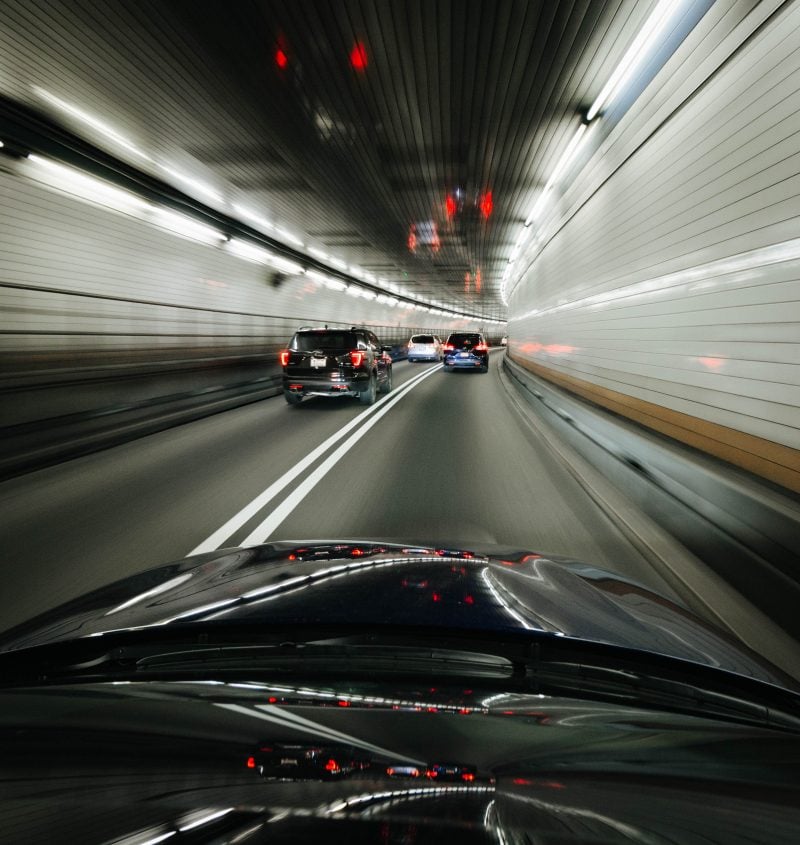
- What I Like: This lens boasts a fantastic price and is extremely lightweight, making it easy to carry around.
- What I Dislike: However, it is designed exclusively for cropped sensor cameras and is not suitable for full-frame bodies.
Due to the crop factor on smaller Canon DSLR cameras, you’ll need a wider lens to get the full wide angle effect. The Canon 10-18mm doesn’t break the bank and will give you an ultra wide field of vision.
This super tiny lens is perfect for traveling with a cropped sensor. For the price, the Canon 10-18mm is the best wide angle lens for Canon crop sensor. It also has built in stabilization which helps to reduce shake for videos and photos.
With a 4.5-5.6 aperture, it will struggle in low light situations but this can be mitigated by using a tripod.
I use this lens when I am vlogging on my Canon 70D, if you’re looking for a camera to vlog with check out my article on that.
This lens is equivalent to a ~16-30mm on a full-frame camera.
For more about converting lens crops try out my crop factor calculator.
If you’re unfamiliar with cropped sensors check out my article that explains the differences between a full frame and crop sensor cameras. If you’re using an entry-level DSLR like a Canon T5 or T6i you are using a APS-C camera with a cropped sensor. Crop sensor Canon mirrorless cameras include the Canon R50 and R7.
- EF S ultra wide zoom lens. Drive System Lead screw and rack system driven by stepping motor
11. Canon EF 24mm f/1.4 II
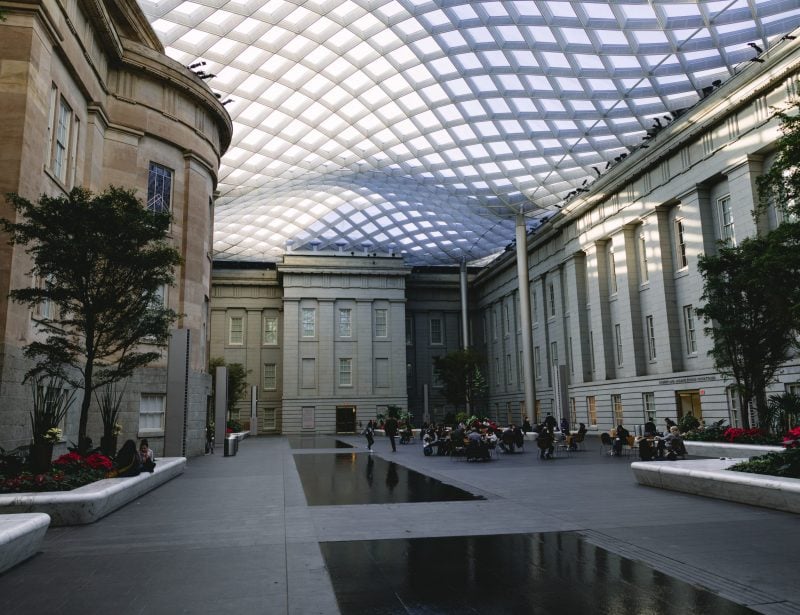
- What I Like: I love the Canon RF 24mm lens for its small, compact design and the fantastic bokeh it produces, giving my photos a professional look.
- What I Dislike: I do find the fixed focal length limiting in some situations, and the EF mount is now outdated, especially if you are building a Canon RF lens collection.
The Canon 24mm is a bit tight but still can get you beautiful wide photos. Its low f/1.4 aperture is great for adding depth of field to your images.
The Canon 24mm f/1.4 II is shockingly fun to shoot with and one of my favorite EF lenses. The f/1.4 aperture lets TONS of light in so you can do all kinds of creative photos with depth of field. It’s a blast to use this lens for handheld night shots. This is your best bet if you need a Canon EF wide angle lens that’s lightweight and easy to travel with with supreme image quality.
12. Sigma EF 14mm f/1.8 – Ultra-wide Prime
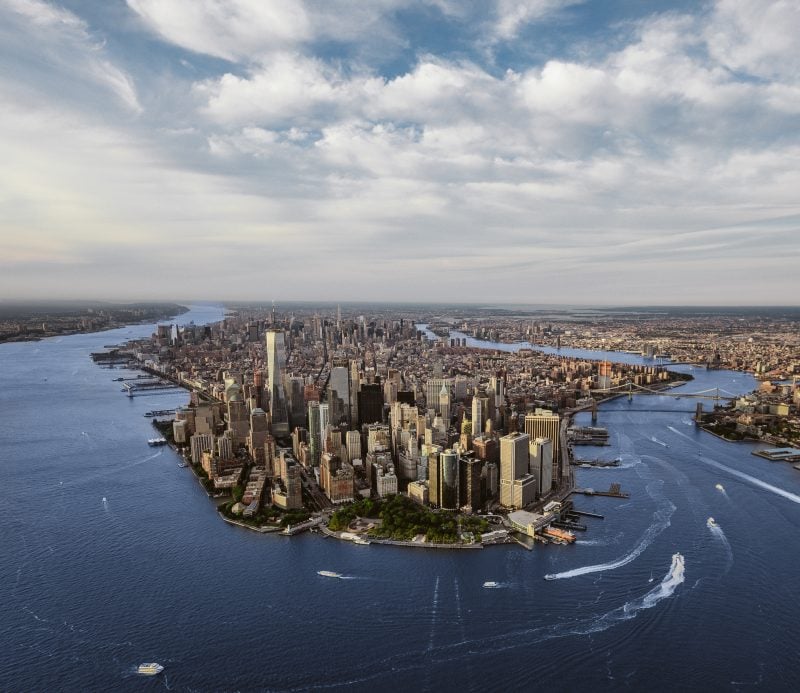
- What I Like: Speaking from my experience, this lens is truly unique, offering an ultra wide-angle perspective that’s perfect for astrophotography.
- What I Dislike: There are a few things I dislike about this lens, mainly it’s expensive, sometimes it can be too wide for certain shots, and you can’t use traditional filters on it. Additionally, it’s quite heavy, and the EF mount is dated.
The Sigma 14mm f/1.8 is an ultra wide angle lens, plus unique with its rare low aperture. This is the go-to lens for astrophotography with its extremely sharp images and low aperture. This isn’t the widest lens possible since Canon also makes a 8-15mm but 14mm is an incredible wide focal length.
On the downside, this is a pretty niche lens and it’s extremely heavy. Also, its curved glass makes it impossible to use traditional lens filters.
- Large diameter delivering f/1.8 brightness
13. Canon EF 11-24mm F/4
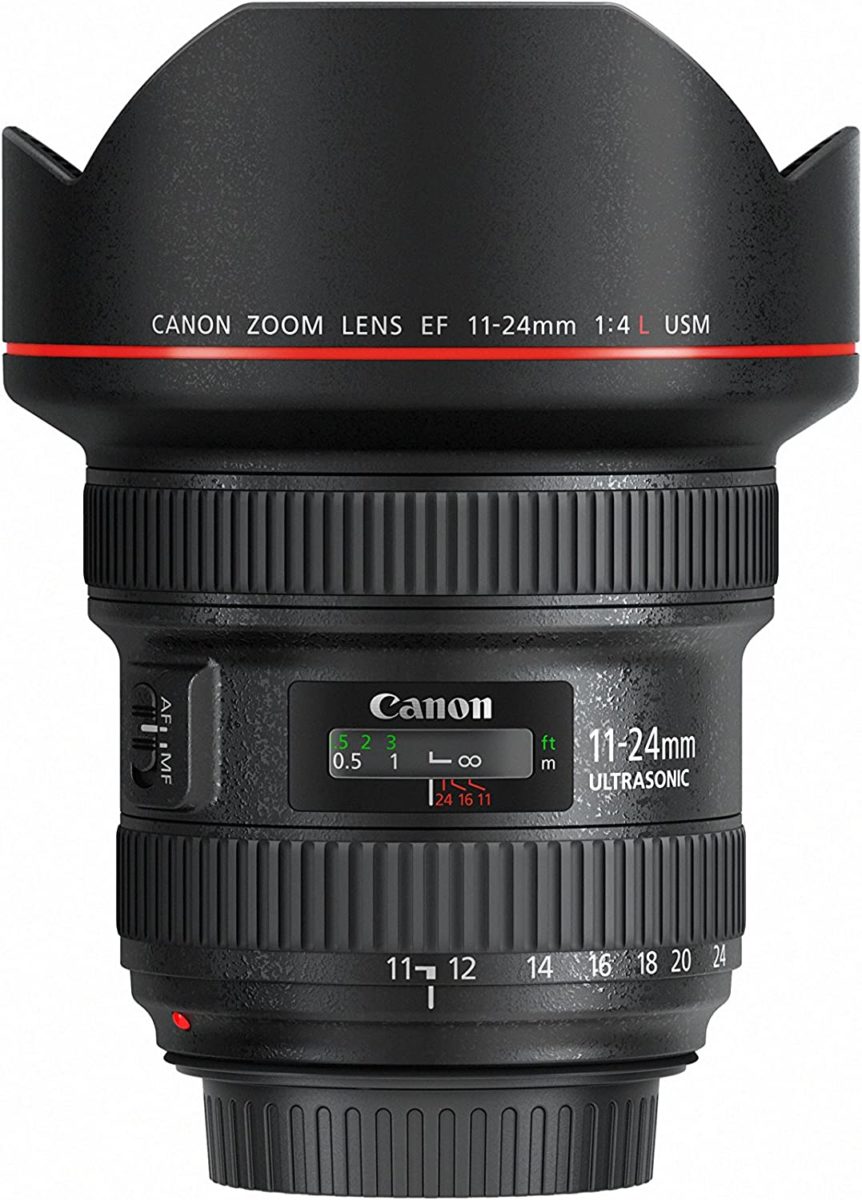
- What I Like: I appreciate the sharp images and great focal range of 11-24mm that this lens offers.
- What I Dislike: There are a few downsides: it’s very expensive, and I can’t use traditional filters on it.
If you’re looking for an extremely wide lens the Canon 11-24mm is a very versatile lens. At its widest 11mm, it’s mostly overkill for any photographer and would likely be used for specific landscape or interior shoots. But if you’re a gear addict having the ability to shoot below 16mm would offer some unique perspectives.
- L-series ultra-wide zoom lens with an impressive 11mm starting focal length
Frequently Asked Questions About Canon Wide Angle Lenses
What are wide angle lenses?
Like we talked about earlier in this article, wide angle lenses are camera lenses that have a shorter focal length than normal lenses, which allows them to capture a wider field of view.
What are the benefits of using a wide angle lens?
Wide angle lenses allow you to capture more of a scene in a single shot, making them ideal for landscape photography, architecture, and interior shots where space is limited.
What makes Canon wide angle lenses a good choice?
Canon is a trusted and reliable brand when it comes to camera equipment, and their wide angle lenses are no exception. They offer a range of high-quality lenses with various features, making it easy to find one that suits your needs.
Do Canon wide angle lenses work with all Canon cameras?
Canon wide angle lenses are designed to work with Canon cameras, but you need to make sure that the lens mount is compatible with your camera model. Canon has many lens mounts including EF, EF-S, RF, RF-S, and EF-M. The Canon mirrorless RF mount like on the Canon EOS R can take many EF lens types using an adapter as well.
What is the difference between a prime and a zoom wide angle lens?
A prime lens has a fixed focal length, while a zoom lens allows you to adjust the focal length. Prime lenses are generally lighter and offer better image quality, while zoom lenses are more versatile and give you a range of focal lengths to zoom though.
Can I use a wide angle lens for portraits?
While wide angle lenses are not typically used for portraits, they can be used creatively to capture unique and interesting shots. However, be aware that using a wide angle lens for portraits can cause distortion and exaggerate facial features, especially near the edge of shots.
What is the best Canon wide angle lens for landscape photography?
As discussed above my favorite Canon lens for landscape photography is the Canon RF 15-35mm f/2.8 since it offers a wide focal length range, low aperture, and image stabilization.
Can I use a wide angle lens for astrophotography?
Yes, wide angle lenses are often used for astrophotography as they allow you to capture more of the night sky in a single shot.
Are Canon wide angle lenses expensive?
Canon wide angle lenses vary in price depending on the features and quality. Some lenses can be quite expensive, while others are more affordable, luckily we’ve covered the whole range in this list!
Of course there are other options like Tamron, Rokinon, and Sigma lenses but I’ve found the best results with using Canon lenses since they are designed to work with Canon cameras.
There are also a few other things to consider when buying a lens. Obviously your use case and budget will take priority over everything. Things like lens stabilization, aperture, and size will all affect how the lens will meet your needs.
Image stabilization in the lens will be important if you plan on shooting handheld or doing videos. It’s important to note that the wider your lens the less important stabilization becomes since it affects the image less.
Looking to buy a camera?
Read: Best Mirrorless Cameras for Travel Photography
In the end, the best wide angle lens for you will have to depend on your budget and use case. Hopefully this list gives you a great idea of what Canon has to offer in terms of wide angle lenses.
Have any questions about Canon lenses? Ask me in the comments below!

